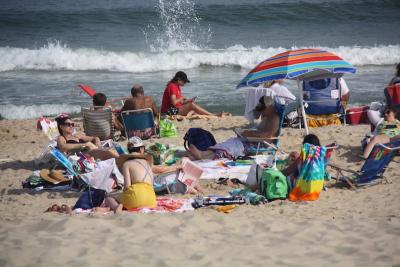East Hampton Village Bans Smoking on the Beach

Businesses will no longer be allowed to distribute single-use plastic straws unless specifically requested, the East Hampton Village Board resolved on Friday. The board also passed a law banning smoking or vaping on public property, including beaches, streets, sidewalks, and parking lots. Both laws will take effect in mid-October, 30 days from passage.
A public hearing on a proposed law to regulate the distribution of magazines and other “handbills” was left open. Mayor Paul F. Rickenbach Jr. requested the extension, until 4 p.m. Monday, to allow residents to weigh in on the issue. Kirby Marcantonio, the publisher of Montauk Life magazine, had expressed concerns about the law’s effect on local businesses.
The handbill law seeks to bring order to the printed materials that often clutter the doorways of shops in the commercial district by requiring that a storeowner or other person of authority agrees to accept them, that they are hand-delivered, and that they are secured in a way that prevents them from becoming litter or a public hazard.
Mr. Marcantonio said he agreed with the law’s intent, but said the village should instead create kiosks or designate specific places where magazines can be safely deposited. That would protect businesses like his, he said, as well as their clients who buy ads in free magazines. “Having people receive that message is important to their businesses, and those businesses are important to the vitality of each community,” Mr. Marcantonio said. He also suggested that the law include the wording of an agreement between a distributor and a storeowner that would establish who is responsible for the materials.
Steven Ringel, executive director of the East Hampton Chamber of Commerce, endorsed the law as proposed, saying that the owners of businesses such as the Golden Pear restaurant, the movie theater, and Petit Blue children’s store have been unable to stop unwanted magazines from arriving on their stoops. They look forward, he said, to having enforceable regulations.
The ban on plastic straws was passed unanimously. Prior to the vote, Arthur Graham, a trustee, suggested expanding it to include the kind of vegetable-based straws that do not biodegrade in the ocean. Barbara Borsack said a discussion of the environmentally detrimental effect of plastic balloons was warranted as well. Ultimately, the trustees decided to take the advice of Linda Riley, the village attorney, and adopt the plastic straw law as is, making amendments later.
The law banning smoking on village property passed with Richard Lawler as the sole dissenting vote. He described the law as being “too broad,” and said he was not in favor of including streets and sidewalks in the prohibition.
Representatives of Bigbelly, a company that manufactures technologically enhanced solar-powered trash compactors for public spaces, presented the latest iteration of their product to the board. In 2012, the company installed one such container in front of the Scoop du Jour ice cream shop on Newtown Lane, where it remains.
The trashcan uses photocell sensors to monitor the amount of garbage within, to gauge when to deploy a compaction mechanism, and when to send an alert to the Department of Public Works that the container is nearing capacity and requires emptying. Franklin Cruz, a distributor, said the compactor can hold five times as much trash as a traditional receptacle. That would mean “fewer bag-change trips, fewer bags used, fewer bags going to the landfill prematurely,” he said.
The container can also house a router to provide Wi-Fi reception at locations with spotty cellular coverage, such as the village beaches.
Alexander Gamota, a senior vice president at Bigbelly, discussed a companion product to the trashcan, the Telebelly, a cabinet containing equipment that boosts cell signals. An attached antenna that extends upward 20 feet would be needed, he said, to prevent signal disruption.
Although Mayor Rickenbach expressed skepticism that the 20-foot attachment would pass muster in a village sensitive to aesthetics, he and the board were impressed by the innovative technology. “We’re very receptive to the concept,” the mayor said, and asked Mr. Gamota to see if a pilot program could be put in place for the latest versions of both Bellies.
In other business, the board accepted Mario Zeledon as a new member of Fire Department Hose Company 3, and approved proposals from South Fork Asphalt for pavement repair at 17 Crossways and 41 Lily Pond Lane, and to install new drainage at 26 and 7 Meadow Way. A proposal from Rosemar Contracting for milling and paving work to be done at Wiborg Beach was also approved.
